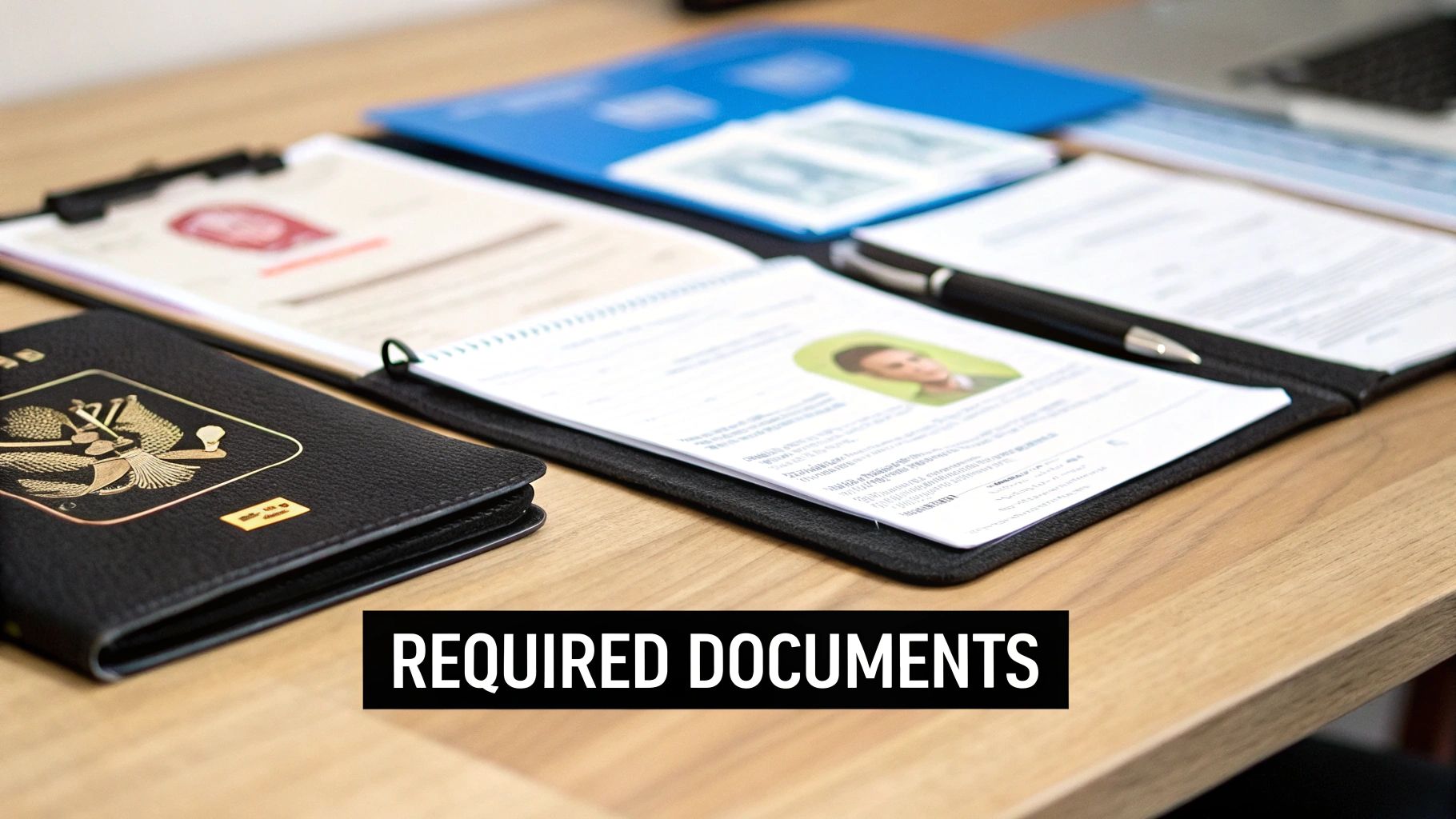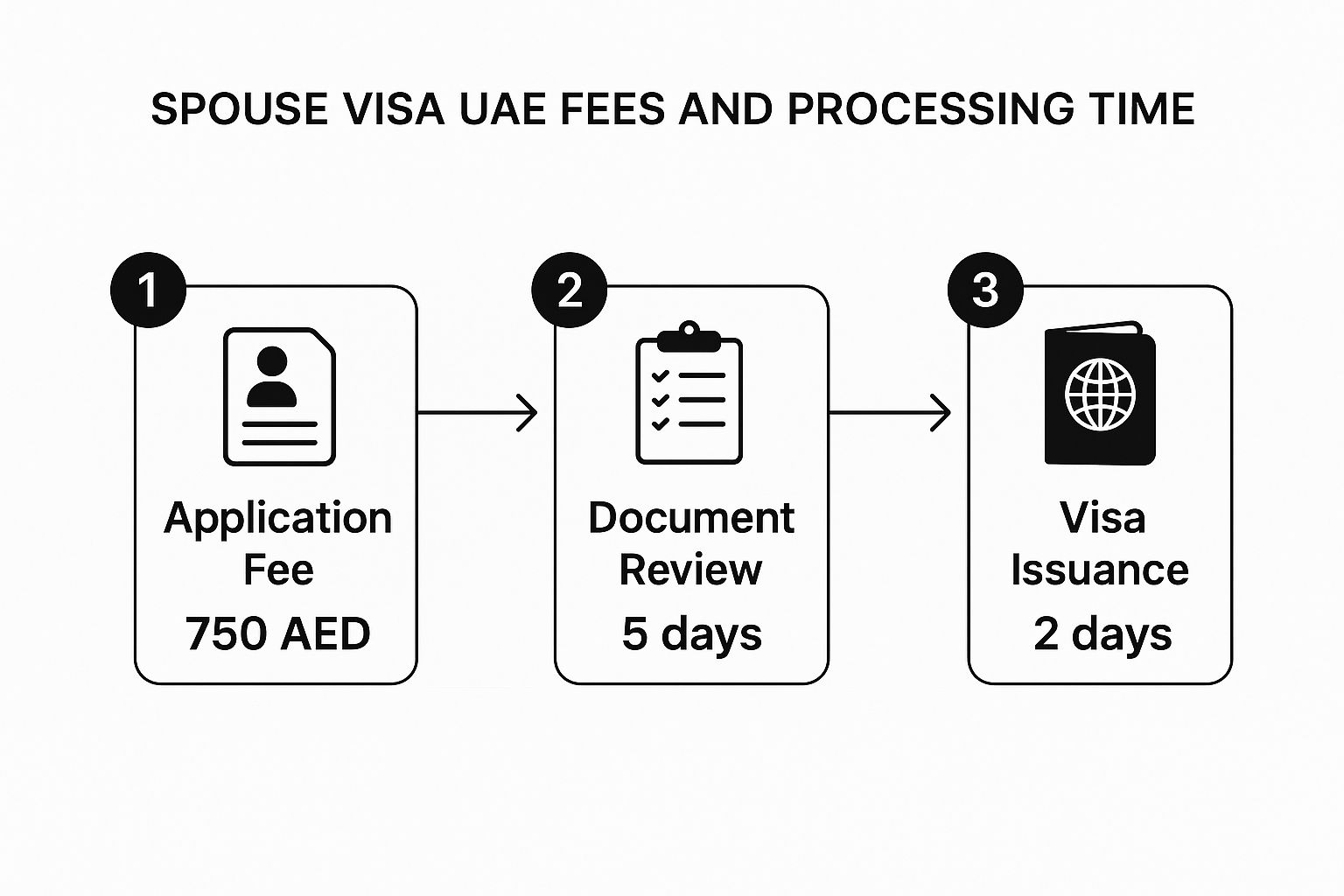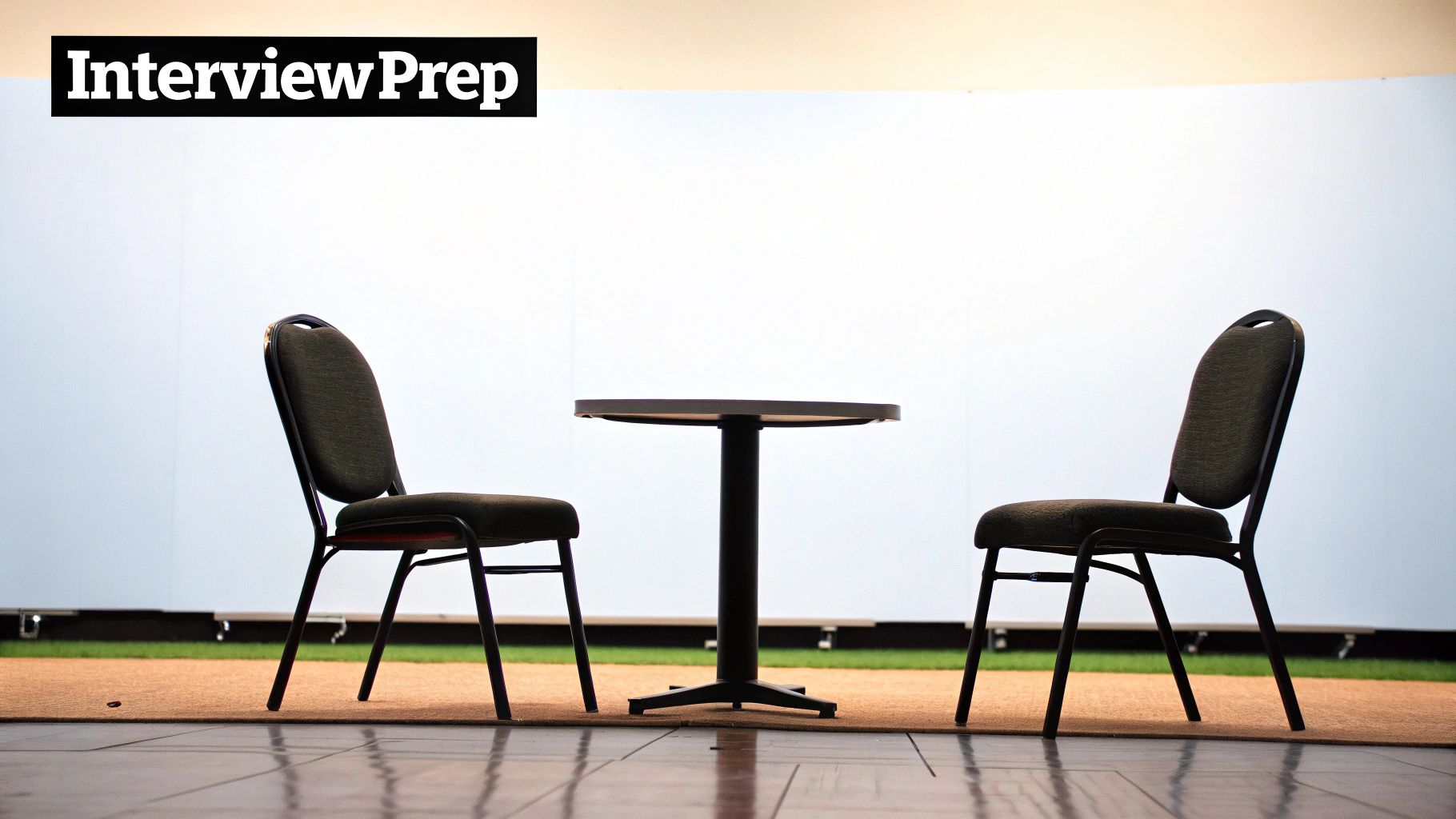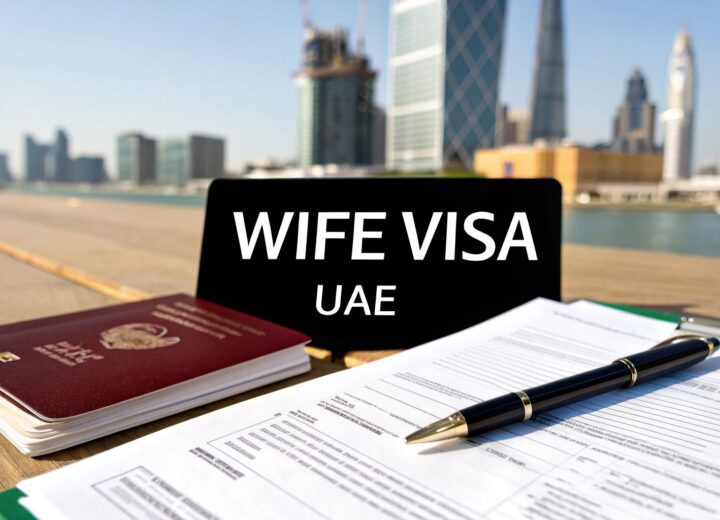A spouse visa in the UAE is essentially a residence permit that lets you, as an expatriate resident, bring your husband or wife over to live with you. It’s the official and legal pathway for families to reunite here, making sure your partner can stay with you long-term and enjoy all the perks of being a UAE resident.
Your Guide to the UAE Spouse Visa
Bringing your spouse to join you in the United Arab Emirates is a huge, exciting step for any expat family. While the spouse visa UAE process has quite a few details to manage, it's a very structured system designed to make family reunification straightforward.
Think of it like building a legal bridge for your loved one to cross over and join you in your new life here. This visa gives your spouse the right to live in the UAE, open their own bank account, and, in most cases, get a work permit if they choose to.
The whole system is built on the idea of sponsorship. As a legally employed resident (the sponsor), you are formally vouching for your spouse (the person being sponsored) and taking responsibility for them during their stay. This is how the UAE ensures everyone living here has a clear legal status and financial support.
Who Is Eligible to Sponsor a Spouse?
Pretty much any expat who holds a valid UAE residence visa can sponsor their spouse, as long as they tick a few specific boxes. The government has put these requirements in place to make sure sponsors can actually support their families comfortably. It’s a key part of how the UAE maintains a high standard of living for everyone.
The main eligibility factors you'll need to cover are:
- Minimum Salary: You have to meet a specific monthly income level.
- Valid Residency: Your own residence visa must be valid and in good standing.
- Legal Marriage: Your marriage needs to be legally recognised, which you’ll prove with an attested marriage certificate.
- Adequate Accommodation: You must have proper housing, usually proven with your tenancy contract (Ejari).
Understanding the Basic Requirements
Getting a handle on the eligibility criteria is the first, and most important, part of the puzzle. According to the current rules, a sponsor needs a valid residency visa, suitable housing, and must earn a minimum monthly salary, which is typically between AED 3,000 and AED 4,000. This salary threshold is there to ensure you can support your spouse without financial strain.
You’ll also need a stack of key documents, including passports, your Emirates ID, the filled-out application form, and a medical clearance certificate for your spouse (if they're over 18).
Working through these requirements is the first real step in the process. The spouse visa is just one type of residency permit, and the entire system has its own set of rules. For a wider view, check out our guide on how to get a UAE residence visa to understand the bigger picture. At its core, the spouse visa is what turns a temporary visit into a stable, long-term life, allowing you and your family to build a future together in the UAE.
So, you’re ready to bring your spouse over to the UAE. That’s a huge step! Before you get lost in the sea of paperwork, the very first thing you need to do is check if you're actually eligible to be a sponsor. Think of this as the foundation of your entire application – if you don’t get this part right, everything else can come tumbling down.
The UAE government has some clear rules in place, and they're not there to make your life difficult. They’re simply designed to ensure that anyone sponsoring a family member can genuinely support them financially. These rules mainly boil down to three things: your salary, your job, and where you live. Let’s break them down so you know exactly where you stand.

The All-Important Salary Requirement
Let's cut to the chase: your monthly salary is the single biggest factor the authorities will look at. They need proof that your income is stable and sufficient to take care of your spouse without any financial strain. The magic number you need to hit actually changes based on whether your employer provides you with a place to live.
The salary requirements are quite specific, so it's crucial to know which category you fall into. It’s a good idea to pull out your labour contract and check the exact figures before you start the process.
Here is a simple table that lays out the minimum salary you’ll need to earn to be eligible to sponsor your spouse.
Sponsor's Minimum Salary Requirements in the UAE
| Sponsor's Status | Minimum Monthly Salary (with accommodation) | Minimum Monthly Salary (without accommodation) |
|---|---|---|
| Male Expat | AED 3,000 (plus accommodation) | AED 4,000 |
| Female Expat (in specific professions) | AED 3,000 (plus accommodation) | AED 4,000 |
| Female Expat (as a teacher, engineer, or in medical sector) | N/A | AED 5,000 |
| Female Expat (other professions, with special approval) | N/A | AED 10,000 |
As you can see, having company accommodation lowers the salary threshold because housing is one of the biggest living costs. This makes a real difference in the eyes of the immigration authorities.
A quick tip: One of the most common hiccups we see is people miscalculating their salary. The government looks at the total figure stated in your official labour contract—that’s your basic salary plus any fixed allowances. Make sure the salary certificate you get from your employer matches what's registered with the Ministry of Human Resources and Emiratisation (MOHRE).
How Your Profession Plays a Role
While your payslip does most of the talking, your job title can also have an impact. The process tends to be a bit more straightforward for people in recognised professional roles like doctors, engineers, teachers, or accountants, as long as they meet the salary requirements.
If your profession is categorised as lower-skilled, you might find the authorities ask for more documents or apply extra scrutiny. The main thing is that your profession, as clearly stated on your employment contract and visa, is accurate and properly classified.
Proving You Have a Suitable Home
You can't sponsor your spouse if you don't have a proper place for them to live. This is a hard-and-fast rule. You’ll need to provide proof of suitable accommodation, which means showing a valid tenancy contract registered with the authorities.
In Dubai, this document is the famous Ejari. In other emirates, it's a similar municipality-attested tenancy contract.
The contract must be in your name. In some cases, if your company provides your housing, the contract can be in your employer's name, but you'll need official documentation linking you to that specific property. This is simply the government’s way of verifying you have a legitimate and adequate home for your growing family.
For instance, if you're a project manager living in a one-bedroom apartment in JLT, you'd submit your Ejari certificate along with a salary certificate showing you earn at least AED 4,000 a month. On the other hand, an engineer in Abu Dhabi whose company provides a studio apartment would need to show their employment contract detailing this benefit, plus proof of earning at least AED 3,000.
Getting these eligibility details right is the first major hurdle. We are specialists in Mainland Company Formation in Dubai, Sharjah & Abu Dhabi and handle these applications every day. Whether you need an Investor Visa or hold a Golden Visa, our cost-effective business setup solutions ensure you're starting on solid ground. Feel free to WhatsApp us today for a free consultation.
Your Complete UAE Spouse Visa Document Checklist
Alright, you’ve confirmed you meet the basic requirements. Now comes what many find to be the most tedious part of the process: gathering all the paperwork. But honestly, if you approach it methodically, it’s just a box-tick-ing exercise. Think of it as building your case for the immigration authorities; each document is a piece of evidence proving your relationship is genuine and that you can support your spouse in the UAE.
Taking the time to get every single document right from the start is the best thing you can do for a stress-free application. A missing paper, an expired ID, or an incorrectly attested certificate can bring everything to a grinding halt. You could face frustrating delays or even an outright rejection, forcing you to start all over again.
To help you avoid that, we've broken down the checklist into two simple parts: what you (the sponsor) need to provide, and what your spouse needs to provide.

Documents Required from the Sponsor
As the sponsor, your job is to prove your legal and financial standing here in the UAE. The government needs to see that you’re a legitimate resident with a steady income and a suitable home for your family.
Here's what you’ll need to get together:
- Passport and Residence Visa Copies: Clear, colour copies of your main passport page and your current UAE residence visa.
- Emirates ID Copy: A colour copy of both the front and back of your valid Emirates ID.
- Original Salary Certificate: This isn't just a letter; it needs to be an official document from your employer, printed on company letterhead and stamped. If you're based in a free zone, you'll get this from the free zone authority.
- Attested Labour Contract: You'll need a copy of your employment contract that has been attested by the Ministry of Human Resources and Emiratisation (MOHRE). This officially confirms your salary and profession.
- Attested Tenancy Contract (Ejari): You must provide your registered tenancy contract to show you have adequate accommodation. In Dubai, this is your Ejari; other emirates have equivalent systems.
- Recent Utility Bill: A recent DEWA or SEWA bill in your name is another great way to prove your address.
- Bank Statements: Sometimes, you might be asked for your last 3 to 6 months of personal bank statements to provide further proof of your financial stability.
A quick pro tip: make sure everything matches. The name, profession, and salary details on your labour contract, salary certificate, and visa must be identical. Any little discrepancy can raise a red flag and slow things down.
Documents Required from the Sponsored Spouse
The paperwork for your spouse is all about verifying their identity and confirming your legal relationship. It’s absolutely vital that these documents are prepared perfectly, especially when it comes to the official attestation process.
Here’s what your spouse will need:
- Passport Copy: A clear, colour copy of their passport. Crucially, it must have at least six months of validity left on it.
- Passport-Sized Photographs: You'll need a few recent, high-quality photos set against a plain white background. It's wise to have 3-5 photos on hand.
- Attested Marriage Certificate: This is the big one. Your original marriage certificate must be attested first by the UAE Embassy in the country where you were married, and then again by the Ministry of Foreign Affairs (MOFA) here in the UAE. If the certificate isn't in English or Arabic, you'll also need to get it legally translated.
The Crucial Step of Document Attestation
So, what exactly is "attestation"? It's simply the official process of verifying a document so that the UAE government will recognise it as authentic. For a spouse visa, the marriage certificate is the main document that needs this treatment. The chain of stamps usually starts in your home country, moves to the UAE embassy there, and finishes at a MOFA counter in the UAE.
This multi-step process can be a real headache, which is why many people just hire professional attestation services to handle it. For example, a marriage certificate from the UK first needs a stamp from the Foreign & Commonwealth Office in the UK before it can even be taken to the UAE Embassy in London for their stamp.
In some situations, particularly if a wife is sponsoring her husband, authorities might also ask for a No Objection Certificate (NOC) from her employer. To get a better sense of what that involves, you can learn all about https://prodesk.ae/what-is-noc-in-uae/. Being diligent with your paperwork is the surest path to a successful application.
Navigating the Step-by-Step Application Process
Alright, you've got all your documents sorted and ready to go. Now for the application itself. The process for getting a spouse visa in the UAE isn't as daunting as it might seem; it's really just a series of logical steps.
Think of it as a journey with several checkpoints. You clear one, then you move on to the next. From getting the initial green light for your spouse to enter the country to that final, satisfying visa stamp in their passport, each stage follows a predictable path. Let’s walk through it together and break this down into a simple, manageable timeline.
Stage 1: Applying for the Entry Permit
First things first: you need to apply for an Entry Permit. This is essentially a pre-approval that allows your spouse to legally come into the UAE for the specific purpose of finalising their residence visa. You simply cannot move forward without it.
You'll submit this application online through the General Directorate of Residency and Foreigners Affairs (GDRFA) portal or by visiting an Amer centre in Dubai (or a Tasheel/ICP centre in other emirates). This is the point where you upload all those documents you've carefully prepared. Once approved, the entry permit is usually valid for 60 days, giving you a comfortable window for your spouse to arrive.
Stage 2: Your Spouse Arrives and Changes Status
With the entry permit approved, your spouse can now travel to the UAE. As soon as they land, the next critical step is to change their legal status from an "entry permit holder" to a "residence visa applicant."
Years ago, this often meant a quick border run—leaving and re-entering the country. Thankfully, things are much easier now. The standard procedure is an "in-country status change," where you pay a fee to handle the transition without your spouse having to go anywhere. This step is what officially kicks off the residency process inside the UAE.
This graphic gives you a quick look at the typical costs and timelines for this initial phase.

As you can see, once you get the ball rolling, the process moves along quite efficiently. The document review usually takes about a week before the visa itself is issued.
Stage 3: Medical Fitness Test
After the status change is complete, it’s time for the mandatory medical fitness test. Anyone over 18 applying for a residence visa in the UAE must pass this screening. It’s a standard procedure designed to protect public health, checking for specific communicable diseases.
Your spouse will need to visit a government-approved health centre for a blood test and a chest X-ray. It’s a straightforward process, and the results are typically ready within 24 to 48 hours. They are sent directly to the immigration authorities, and you'll receive a "Fit" certificate, which is an absolute must-have for the final visa stamping.
Stage 4: Emirates ID Application and Biometrics
While you're waiting for the medical results to come through, you can get started on the Emirates ID application. This card is a legal requirement for every resident and will be your spouse's primary form of identification across the country.
Here's how it works:
- Fill out the form: You can do this at an authorised typing centre or use the ICP Smart Services app.
- Provide biometrics: Your spouse will then visit an Emirates ID service centre for a quick appointment to give their fingerprints and have their photo taken.
- Get the card: The physical ID card is printed and couriered to you only after the residence visa has been stamped in their passport.
Just remember, the Emirates ID and the residence visa are two sides of the same coin. You can't finalise one without the other; it’s all part of a single, integrated system.
Stage 5: Final Visa Stamping
This is it—the final checkpoint! Once the medical test is passed and the Emirates ID application is in the system, you can submit your spouse's passport to get the residence visa stamped. This is the physical sticker that goes into the passport, officially confirming their legal residency in the UAE.
The visa will show your spouse's name, your name as the sponsor, and the validity period. This typically ranges from one to three years, depending on your own visa and employment contract.
Juggling these steps can feel like a full-time job. From Freezone Company Formation across the UAE to Golden Visa on Property, our team has seen it all. If you need a hand with your spouse's visa or require expert Corporate PRO Services and Attestation Services, we're here with 24/7 support service. Call us now: +971-54-4710034 to ensure your application goes off without a hitch.
Getting to Grips with the Costs and Timelines
When you're planning to bring your spouse to the UAE, the last thing you want are financial surprises. Figuring out the budget for a spouse visa is just as crucial as gathering all the right paperwork. Let's break down exactly what you should expect to pay and how long the whole process is likely to take, so you can plan with confidence.
We'll cover everything from the non-negotiable government fees to those other costs that can sometimes catch people off guard.

A Breakdown of Core Government Fees
The total cost isn't one single payment. Instead, it’s a series of smaller fees paid at different points in the application journey. While the government can adjust these amounts, this breakdown gives you a very reliable estimate to work with.
Here are the main costs you'll encounter:
- Entry Permit Application: Kicking things off, this first step will set you back about AED 1,200. The final figure can fluctuate slightly depending on whether your spouse is applying from inside or outside the UAE.
- Status Change: If your spouse is already in the country on a tourist or visit visa, this is a key step. For roughly AED 650, you can change their visa status without them having to leave and re-enter the UAE. It’s a huge convenience.
- Visa Stamping and Emirates ID: This is the final leg. The fees for stamping the visa in the passport and issuing the Emirates ID card usually come to between AED 800 and AED 1,000. The exact amount depends on whether the visa is for one, two, or three years.
Accounting for Other Essential Costs
The government fees are just one part of the picture. There are several other expenses that are easy to overlook but are absolutely necessary for your application to be successful.
Be sure to factor these into your budget:
- Document Attestation: Your marriage certificate needs to be officially attested. This can cost anywhere from AED 500 to AED 1,500—sometimes even more. The price really depends on which country the certificate was issued in and how quickly you need it done.
- Legal Translation: If your documents aren't in Arabic or English, you'll need to have them translated by a certified legal translator. This is a requirement that can't be skipped.
- Medical Fitness Test: The mandatory medical test comes with different price points. A standard test is about AED 320, but you can pay more for urgent services if you need the results in a hurry.
- Mandatory Health Insurance: Your spouse must have a valid UAE health insurance policy. Premiums can vary dramatically, from AED 1,000 to over AED 5,000 per year, depending on the level of coverage, age, and other factors.
The way family visa costs are structured in the UAE shows how the country balances making the process accessible with maintaining tight regulatory control. Visas typically last one to three years, and when they expire, you have to renew them with updated documents to prove you still meet the criteria. These costs can add up, which is why many expat families turn to professionals to help make the process smoother and more cost-effective. You can find more details about UAE family visa costs on terratern.com.
Realistic Timelines for the Entire Process
Knowing how long things will take helps manage expectations. While there are often "urgent" options available for a higher fee, a standard application moves along a fairly predictable timeline.
From start to finish, you can generally expect the entire spouse visa process to take between 10 to 20 working days. This assumes, of course, that all your documents are correct and ready to go, and there are no public holidays slowing things down.
Delays almost always happen because of incorrect documents, missing attestations, or administrative backlogs. This is where working with a specialist in Corporate PRO Services can be a real game-changer, helping you sidestep common mistakes and keep your application on track. With our 24/7 support service – always here when you need us. WhatsApp us today for a free consultation.
Keeping Your Spouse Visa Active: Renewals and Cancellations
Getting a spouse visa in the UAE is a huge milestone, but it's not a "set it and forget it" situation. This visa comes with an expiry date, and it’s your responsibility to keep it valid. Staying on top of the renewal process is key to avoiding fines and making sure your spouse can legally stay in the country.
The good news is that renewing is usually much simpler than the initial application.
Think of it like a routine check-in. The government just needs to see that the conditions under which you first sponsored your spouse are still being met. This means they'll want to confirm you're still employed, meet the salary requirements, and have a valid tenancy contract.
How to Renew the Spouse Visa
My best advice? Don't leave it to the last minute. You can start the renewal process up to 30 days before the visa expires, which gives you a comfortable window to get everything in order without any stress.
Here’s a quick breakdown of what you’ll need to do:
- Repeat the Medical Fitness Test: Your spouse will need to go for another medical screening at an approved government health centre.
- Renew the Emirates ID: At the same time, you'll need to start the application to renew the Emirates ID. For a detailed walkthrough, you can check out our guide on the Emirates ID renewal process.
- Lodge the Renewal Application: Once you have the passed medical report, you can take all your updated documents to an Amer or typing centre to formally submit the renewal request.
As long as your personal and professional circumstances haven’t changed, the renewal should go smoothly.
What to Do If You Need to Cancel the Visa
Life happens, and sometimes plans change. Whether you're leaving the UAE or going through a divorce, you are legally required to officially cancel your spouse's visa. It's a common misconception that you can just let it expire if your spouse is outside the country, but this can cause serious problems down the line.
To do it correctly, you need to submit a cancellation application through the official channels. This formally ends your sponsorship and clears both your records with immigration, preventing any legal hurdles if either of you wants to return to the UAE later. It's the final, crucial step in your responsibility as a sponsor.
The UAE's entire approach to family residency is designed to attract and retain skilled professionals. While different from a standard spouse visa, the rise of the UAE Golden Visa highlights this trend. Golden Visa holders can also sponsor their families with ease, and the number of these visas jumped from 47,150 in 2021 to 158,000 in 2023. It shows just how committed the UAE is to making long-term family life here a reality. You can find more UAE Golden Visa trends on jsb.ae.
Common Questions About the UAE Spouse Visa
When you're dealing with the specifics of a spouse visa in the UAE, it's natural for questions to pop up. Let's tackle some of the most common ones we hear from applicants, giving you the clear answers you need to feel confident.
Can a Wife Sponsor Her Husband in the UAE?
Yes, absolutely. A wife can sponsor her husband, but you should know that the requirements are a bit more stringent than the other way around.
Typically, the wife needs to be employed in a specific professional field, like teaching, medicine, or engineering. The salary threshold is also higher—usually AED 10,000 per month, or AED 8,000 if company accommodation is provided. It's important to remember that the final decision always rests with the immigration authorities.
What Should I Do If My Visa Application Is Rejected?
First off, don't panic. If your application is rejected, you'll be notified, and often the reason for the refusal will be included.
Common culprits are things like missing documents, not passing the medical fitness test, or failing to meet the minimum salary. The best first step is to head to the nearest Amer or Tasheel centre. They can explain the exact reason for the rejection, help you fix the issue, and guide you on reapplying.
Does My Spouse Have to Leave the UAE for the Visa?
Not anymore, in most situations. If your spouse is already in the UAE on a visit or tourist visa, you can perform an "in-country status change" once their entry permit is issued.
This handy process lets you switch their visa status from visitor to resident without them ever having to leave the country. While it comes with an extra fee, it saves a huge amount of time and the cost of a flight. As you plan your family's move, you might also be thinking about your furry family members. For detailed guidance, you can find helpful information on pet travel to the UAE.
Whether you're working through the spouse visa process, aiming for a Golden Visa, or need professional PRO services for your business, we can help. As specialists in Golden Visa on Property and Investor Visa, we offer cost-effective business setup solutions tailored to your needs so you can enjoy UAE tax benefits for international entrepreneurs.
✅ Specialists in Mainland Company Formation in Dubai, Sharjah & Abu Dhabi
✅ Specialists in Freezone Company Formation across the UAE
✅ Specialists in Corporate PRO Services and Attestation Services
✅ 24/7 Support Service – Always here when you need us
📞 Call Us Now: +971-54-4710034
💬 WhatsApp Us Today for a Free Consultation at https://prodesk.ae





